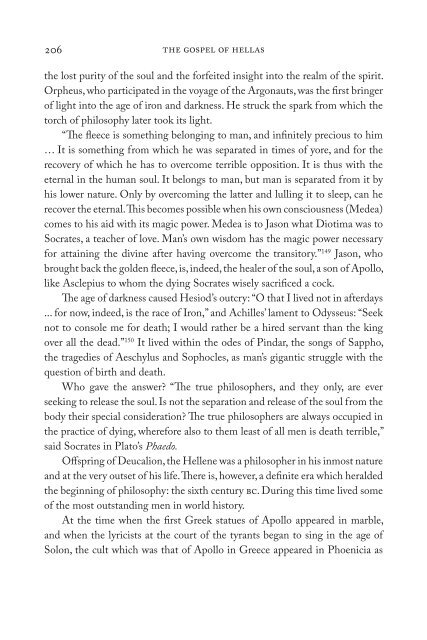The Gospel of Hellas - Research Institute for Waldorf Education
The Gospel of Hellas - Research Institute for Waldorf Education
The Gospel of Hellas - Research Institute for Waldorf Education
You also want an ePaper? Increase the reach of your titles
YUMPU automatically turns print PDFs into web optimized ePapers that Google loves.
0 the gospel <strong>of</strong> hellas<br />
the lost purity <strong>of</strong> the soul and the <strong>for</strong>feited insight into the realm <strong>of</strong> the spirit.<br />
Orpheus, who participated in the voyage <strong>of</strong> the Argonauts, was the first bringer<br />
<strong>of</strong> light into the age <strong>of</strong> iron and darkness. He struck the spark from which the<br />
torch <strong>of</strong> philosophy later took its light.<br />
“<strong>The</strong> fleece is something belonging to man, and infinitely precious to him<br />
… It is something from which he was separated in times <strong>of</strong> yore, and <strong>for</strong> the<br />
recovery <strong>of</strong> which he has to overcome terrible opposition. It is thus with the<br />
eternal in the human soul. It belongs to man, but man is separated from it by<br />
his lower nature. Only by overcoming the latter and lulling it to sleep, can he<br />
recover the eternal. This becomes possible when his own consciousness (Medea)<br />
comes to his aid with its magic power. Medea is to Jason what Diotima was to<br />
Socrates, a teacher <strong>of</strong> love. Man’s own wisdom has the magic power necessary<br />
<strong>for</strong> attaining the divine after having overcome the transitory.” 149 Jason, who<br />
brought back the golden fleece, is, indeed, the healer <strong>of</strong> the soul, a son <strong>of</strong> Apollo,<br />
like Asclepius to whom the dying Socrates wisely sacrificed a cock.<br />
<strong>The</strong> age <strong>of</strong> darkness caused Hesiod’s outcry: “O that I lived not in afterdays<br />
... <strong>for</strong> now, indeed, is the race <strong>of</strong> Iron,” and Achilles’ lament to Odysseus: “Seek<br />
not to console me <strong>for</strong> death; I would rather be a hired servant than the king<br />
over all the dead.” 150 It lived within the odes <strong>of</strong> Pindar, the songs <strong>of</strong> Sappho,<br />
the tragedies <strong>of</strong> Aeschylus and Sophocles, as man’s gigantic struggle with the<br />
question <strong>of</strong> birth and death.<br />
Who gave the answer? “<strong>The</strong> true philosophers, and they only, are ever<br />
seeking to release the soul. Is not the separation and release <strong>of</strong> the soul from the<br />
body their special consideration? <strong>The</strong> true philosophers are always occupied in<br />
the practice <strong>of</strong> dying, where<strong>for</strong>e also to them least <strong>of</strong> all men is death terrible,”<br />
said Socrates in Plato’s Phaedo.<br />
Offspring <strong>of</strong> Deucalion, the Hellene was a philosopher in his inmost nature<br />
and at the very outset <strong>of</strong> his life. <strong>The</strong>re is, however, a definite era which heralded<br />
the beginning <strong>of</strong> philosophy: the sixth century bc. During this time lived some<br />
<strong>of</strong> the most outstanding men in world history.<br />
At the time when the first Greek statues <strong>of</strong> Apollo appeared in marble,<br />
and when the lyricists at the court <strong>of</strong> the tyrants began to sing in the age <strong>of</strong><br />
Solon, the cult which was that <strong>of</strong> Apollo in Greece appeared in Phoenicia as

















